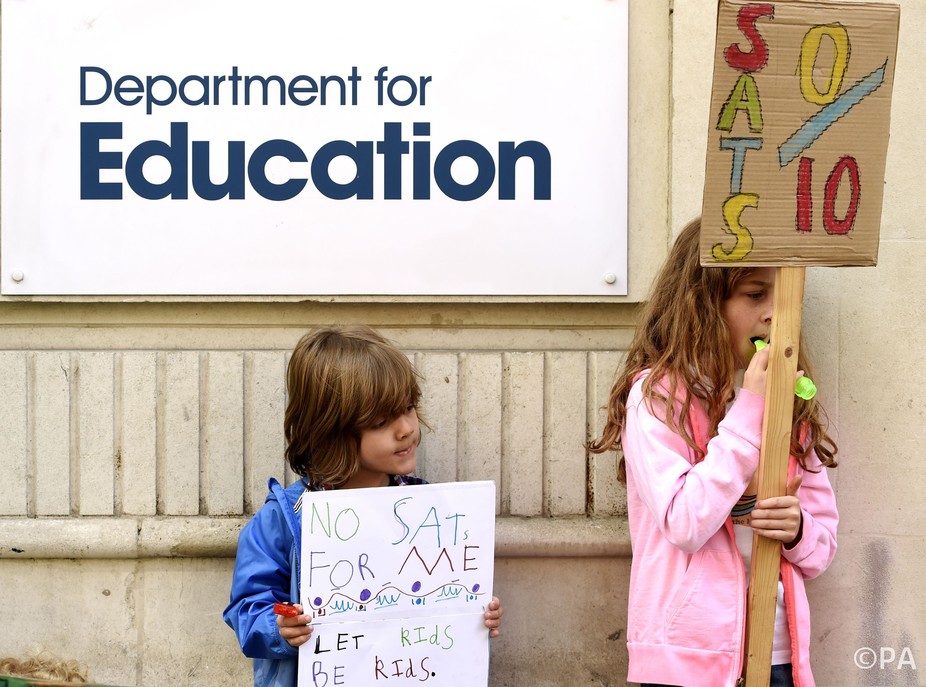Stressed out: the psychological effects of tests on primary school children

Laura Nicholson, Edge Hill University
Some parents are so angry with the testing regime facing their children that they have come together in an attempt to boycott primary school exams. Preparation by teachers for these standardised achievement tests (SATs) in England have involved a narrowing of the curriculum, including a specific focus on spelling, punctuation and grammar.
Parents believe that their children should be stimulated instead by more enriching activities and projects. There is also a worry that the tests may cause undue stress and pressure on their young children to perform well. These beliefs are widespread: more than 49,000 parents have signed a petition to abolish SATs altogether.
An awareness of pressure
Teachers are under considerable pressure for pupils to perform well on SATs. Performance-related pay and position in school league tables depend on test results. Parents believe that exam results will have a bearing on their young child’s future and understandably want them to do well.
But the children are also well-aware that their performance on the SATs is important to their teachers and parents. Teachers may unwittingly transmit the stress they are under to their pupils. Children can also pick up on their parents’ attitudes and associated behaviour and feel under pressure to make them proud.

Too much, too young? Shuravaya/www.shutterstock.com
This pressure from parents is perhaps the largest source of stress for children aged ten to 11 who are working towards their Key Stage 2 exams. One Year 6 pupil my colleagues and I interviewed described the source of the pressure he felt:
You want to get them [SATS questions] right because other people want you to get them right and, like, you don’t want to disappoint people.
Test anxiety
Stress and pressure about forthcoming exams can result in what education researchers have termed “test anxiety”. This can present itself via a number of symptoms.
Children can suffer from negative thoughts such as: “If I don’t pass this test, I will never get a good job”. They can also suffer physiological symptoms such as tight muscles or trembling and distracting behaviours such as playing with a pencil. The effects of anxiety during a test can influence the child’s ability to process and understand test questions and perform at their best.
It is well established that pupils with high levels of test anxiety perform more poorly in their exams. The overall prevalence of test anxiety in primary school children is on the increase and it is fairly common for children at the end of primary school. Year 6 pupils report experiencing anxiety either some or most of the time when asked two weeks prior to their exams.
But there are differences in how SATs are viewed by different children. Some perceive them to be stressful, while others view them as a challenge. As well as pressure from parents, pupils in Year 6 have cited the demands of the testing situation as a cause of stress. This includes completing exams under timed conditions and having no contact with classmates or teachers. There are also concerns about exam results being used to influence which set a child will be put in at secondary school. Another Year 6 pupil my colleagues and I interviewed said:
You look at your booklet and you’ve got like loads of questions left and you’re like, ‘I can’t do this’. You just want to just sit there and go ‘I can’t do this’ and walk off.
The extent to which children aged six to seven, working towards Key Stage 1 exams, feel test-anxious, is unclear. Very little research has been conducted exclusively with them. Some younger children, however, have been found to display clear signs of anxiety or stress during the period leading up to the SATs.
Reducing the pressure
How resilient a child is can reduce the negative effects of test anxiety on performance. Specifically, children who believe they can succeed, trust and seek comfort from others easily and who are not overly sensitive, can be better at combatting the problems associated with test anxiety. Parents may therefore help their children by attempting to nurture and boost their resilience.
Keeping SATs “low-key” is crucial to minimising anxiety and stress among children. Parents should reassure their children that results are not critical and that the most important thing is that they try their best. In the classroom, teachers should direct time and effort towards familiarising children to the format and procedures involved in standardised testing. For instance, practising with past test papers while children sit at individual desks, could help.
Both parents and teachers could also keep a conscious check of how they may subconsciously transmit feelings of stress or tension to young children. Pupils who display signs of test anxiety require more space and understanding, both at school and home – this includes increased tolerance during the testing period.
These strategies may go some way to reducing the pressure of tests on young children. It is essential that schools and teachers take the time to focus on the social, emotional and mental health and development of children.
![]()
Laura Nicholson, Researcher, Faculty of Education and Associate Tutor, Department of Psychology, Edge Hill University
This article was originally published on The Conversation. Read the original article.






